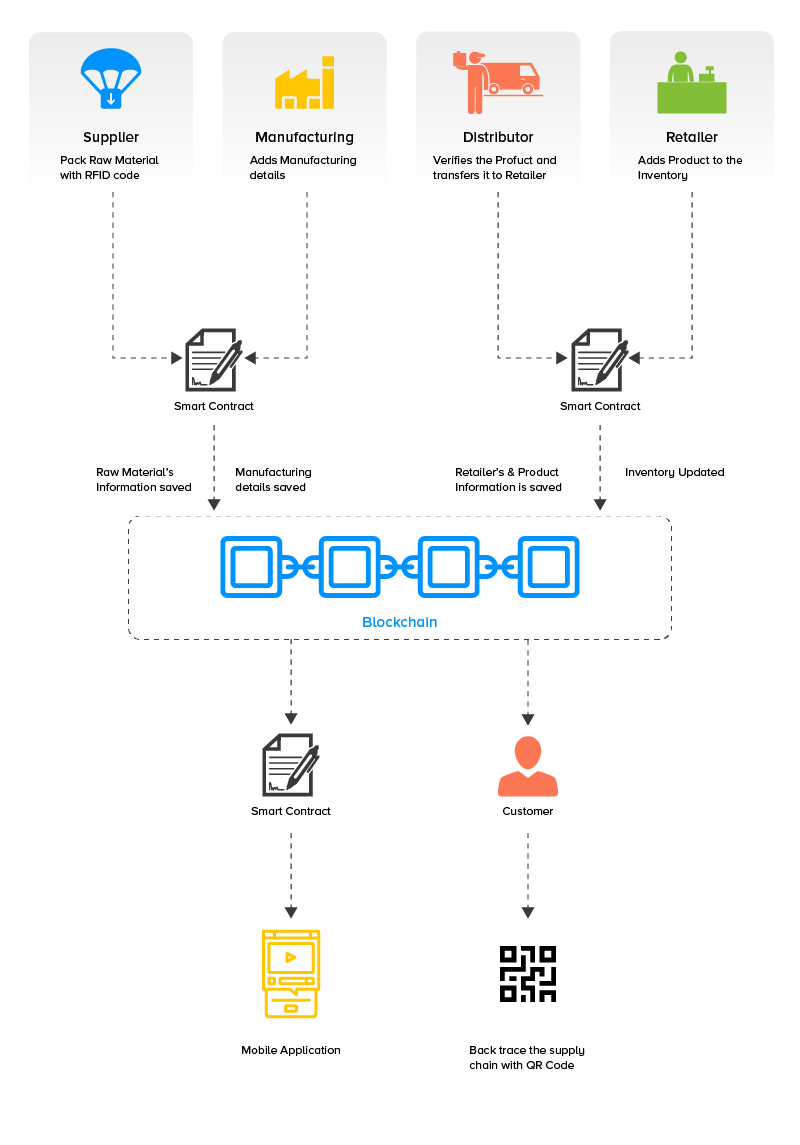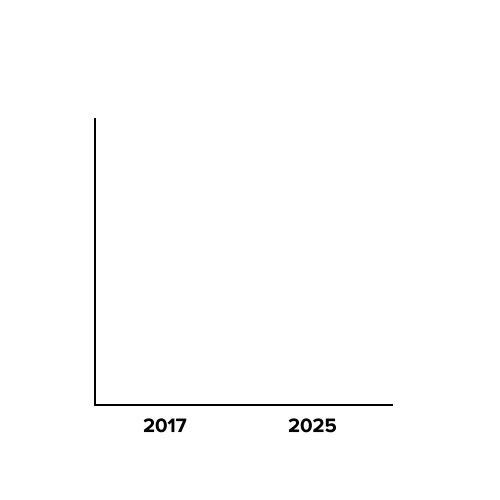How is blockchain disrupting supply chain management
Blockchain in Supply Chain: Is the Combination the Answer to the Sector’s Trustability Issues
Over the last fifty years, supply chain management has evolved to become one of the most extensive and complex industry operational on a global landscape. This, for a number of sectors, doesn’t come off as a surprise. After all, the increasing globalization had to bring a surge in the complexity in supply chain management as a side effect.
But the use of blockchain in food supply chain is beneficial as it is rapidly addressing all the elements for ease of process and reducing the cost of the farming processes.
The problem, however, stands at the fact that although the business models and expectations have transformed, the issues around transparency and origin tracking continue to dominate the sector.
Fortunately, blockchain in supply chain poses to be the solution that might bring improvements in the problematic state of the current supply chain ecosystem.
Table of Content
- What is Supply Chain Management?
- What Are The Challenges In Supply Chain Management?
- Top 6 Blockchain Supply Chain Use Cases
- Technologies That Will Tweak Blockchain-Based Supply Chain Management System
- What Are The Limitations of Blockchain-based Supply Chain Management
- Frequently Asked Questions About The Impact of Blockchain in Supply Chain Process
Let’s discover in this article, where we will firstly outline the current landscape of the supply chain and then move to how Blockchain would make a difference.
So, without ado, let’s begin with a simple definition of Supply Chain Management (SCM).
What is Supply Chain Management?
Supply Chain Management (SCM), in layman’s language, is an approach to managing the flow of goods, resources, services, and information throughout the process of turning raw materials into a full-fledged finished product delivered at the customer end.
The supply chain process comprises seven core components, namely: Planning, Information, Source, Inventory, Production, Location, Transportation, and Return of Goods, with which it builds the basic infrastructure of any organization. It actually fuels the present and future of any business, and thus, holds a huge momentum in the business world.
However, due to growing security threats and changing consumer needs, the traditional supply chains are facing different challenges in delivering a highly-efficient and trustable ecosystem to all. A few of which we will touch upon in the next section of the article.
What Are The Challenges In Supply Chain Management?

1. No universal database
Despite the fact that our world has become interconnected, various organizations are still keeping their database confined to themselves. All the teams are making their individual records and sharing with each other only on request. A result of this is that there are various communication gaps between any two parties, which benefits the exploiters.
2. Inadequate assets traceability
Another challenge found in supply chain management is the inability to trace assets. They have introduced the finest of equipment and processes for keeping an eye on inhouse activities, but no such method to trace the state of products once out for delivery. This is making it easier for exploiters to replace the original product with ‘lookalike’ counterfeit ones.
3. Undue costs
Since every team creates and maintains an individual database of data, they often invest their efforts and capital into gathering the same information again and again. This brings a drastic rise in the associated cost.
4. Lengthy quality analysis process
Because of discontinuity in the current SCM process, it is an extensive and expensive task to determine at which point the quality has been compromised, or the product has been replaced. Additionally, because of a centralized structure, company’s processes are generally exposed to multiple risks like code of conduct violations and frauds – highlighting the dire fact that there is a lack of effective risk management process in supply chain systems.
5. Inability to satisfy customer needs
Last but not least, entrepreneurs are also finding it hard to stay updated with changing user demands and bringing required changes into their working strategies, when going with the current supply chain management process.
Because of such issues in the supply chain and the rising competition, most of the firms, if not all, have started showing an interest in the concept of introducing Blockchain in the supply chain. They are putting efforts into understanding the basics of Blockchain and the ways it is revamping different industries – be it Real Estate, Healthcare, Fintech, or Enterprise.
Now while the role of blockchain on economy is fairly widespread, let us concentrate our discussion on the impact of blockchain inclusion in supply chain management.
Top 6 Blockchain Supply Chain Use Cases
1. Real-time tracking
A Blockchain-powered supply chain management process operates within the characteristics of transparency and decentralization. This makes it easier for one to be familiar with every activity going around at any point in time. The benefit of this is not just evident in the manufacturing sector, but also in how blockchain makes the fashion industry transparent.
2. Faster processing
Even though supply chains can handle complex and large data sets a number of the processes, specifically ones belonging to lower supply tiers are slow and heavily dependent on paper – something that is very common in the shipping industry. What worsens the process further is the presence of intermediaries. By replacing third-party intermediaries and elimination of the dependency on pen and paper with Smart Contracts, Blockchain also cuts down the operation time.
3. Strengthening traceability
Growing demand and regulations around provenance information is driving considerable change in the supply chain domain. Bettering traceability through inclusion of blockchain technology in supply chain leads to an added value created by mitigation of high cost of quality-related issues like reputational damage, recalls, and revenue loss because of grey or black market products.
4. Healthy customer relationships
With the help of Blockchain, consumers are able to know everything about the product they are using. Blockchain for order management plays a huge role in elevating customer experience by making the process of order tracking transparent.. Additionally, customers are able to check the genuinity of their products. This is shaping a sense of trust among the consumers and the respective brands.
5. Higher ROI
Above all, Blockchain is helping businesses in creating a better brand image in the decentralized market and enjoying higher ROI.
6. Effective tradeability
Blockchain in supply chain enables efficient licensing and ownership. By the help of smart contracts, blockchain can be applied to accurately license services, software, and products. Additionally, blockchain offers consensus – that means there is no dispute in chains related to the transactions by designs. All the entities present on the blockchain have the same ledger version added with the potential to track the ownership records.
The aforementioned pointers would have given you a sneak peek of what the application of blockchain in supply chain management means. But, for better clarity, let’s revisit the whole process of integration of Blockchain in the supply chain via this image.

With the benefits of blockchain in supply chain management covered, the next question to tackle is – Is there any practical implementation of Blockchain in the market? Does any brand encourage the idea of considering Blockchain in the supply chain?
Various brands, as mentioned in the image below, are already leveraging the benefits of the collaboration of Blockchain and Supply chain management to lay down the basis of blockchain-based supply chain management systems.

Not only this, but the blockchain market in the supply chain domain is also expected to grow exponentially in the coming years.

The growing adoption of the technology in supply chain domain is making now the ebay time to partner with a skilled Blockchain development company and discover the many use cases of the technology & process convergence.
Blockchain & New-age Technologies’ Convergence Making Supply Chain Management Effective
1. Artificial Intelligence (AI)
The convergence of Blockchain and AI will enable the former to manage data in a simplified and effective manner. It will also add more security to the ecosystem using the power of predictive analytics and improve scalability.
2. Internet of Things (IoT)
Introducing IoT in Blockchain, also termed as Blockchain of Things, will also improve its near future in the supply chain and logistics domain. The dual technologies will make it easier to keep a real-time track of every activity across the chain and inform the connected devices for troubleshooting purposes.
3. Beacon Technology
Another technology that will boost the use of Blockchain in the supply chain management process is Beacon. It will enable businesses to guide all of their coworkers and users about their product and its real-time status, which will bring a sense of trust in the whole process.
Until this point, we have looked into the many benefits that applications of blockchain in supply chain introduces in the sector in addition to how blockchain can be merged with new-gen technologies to double the value offering. However, for a business looking to enter the blockchain in supply chain ecosystem, it is important to understand and discuss the limitations of the convergence with their partnered blockchain app developers.
What Are The Limitations of Blockchain-based Supply Chain Management

1. Immature Ecosystem
Blockchain has proven to be an umbrella term for multiple techniques, platforms, and use cases. However, this is not the end.
Business enthusiasts and developers are exploring its potential in multiple business verticals and processes. They are trying to experiment and come up with better solutions, but are still struggling in terms of scalability, transaction speed, and other such traits.
So, when looking ahead to introduce blockchain technology into your project, be ready to face all such imperfections because of the ‘still-evolving’ ecosystem.
2. Lack of technological know-how
For a long time, people lived with the notion that Blockchain is just hype. The technology will soon go extinct. An outcome of which is that despite the availability of various basic Blockchain app development guides, many are still unfamiliar with what exactly is Blockchain and how to incorporate it into their traditional processes.
So, you might face the challenge of making people understand the technology, different Blockchain programming languages to work with, business concepts to embrace and build a perfect solution.
3. Legal and regulatory challenges
Last but not least, various countries like China and Russia are still not in favor of the use of cryptocurrencies and the underlying technology. They have serious legal rules and regulations against those opting for cryptocurrencies and Blockchain technology. Whereas, when talking about other nations, there are very few which have accepted blockchain adoption with open hands.
In such a scenario, it will again be a challenge for you to build a Blockchain-based solution such that they do not conflict with these legal rules and regulations.
As you can conclude from these challenges, embarking on a Blockchain journey is not a cakewalk. You would have to rethink your supply chain management model twice or even thrice to see how Blockchain fits effectively. And this won’t be possible without having a blockchain supply chain development company in your corner.
So, contact the best Blockchain consultants today itself. Also, keeping yourself abreast with top Blockchain technology trends and a set of technologies that would unfold better outcomes in the near future will also be a profitable act. This information will aid you to become a leader in the Blockchain-powered, digitally transformed supply chain ecosystem.
So, taking the same into consideration, let’s wrap up this article while focusing on what technologies will enhance the future of Blockchain in the supply chain domain.
Frequently Asked Questions About The Impact of Blockchain in Supply Chain Process
Q. What is Supply Chain Management and Why is it Important?
Supply chain management is a cross-functional approach that involves managing everything right from the flow of raw materials to internal processing and delivery of the final product at the customers’ end. It holds huge importance in the market because it reduces operating time and cost, enhances the financial standards, boosts customer services, and more.
Q. How can Blockchain be used in Supply Chain?
The role of blockchain in supply chain can be multiple:
- Real-time tracking of goods,
- Ease of payment,
- Reduction in time and cost involved with gathering and sharing of information, etc.
Q. Which Blockchain tool is best for Supply Chain?
With multiple Blockchain-based platforms and tools available in the industry, the answer to which would be the best would vary from use case to use case for every blockchain supply chain management companies. So, it is best to discuss with our hired Blockchain development company and then make a decision.

strategies your digital product..



